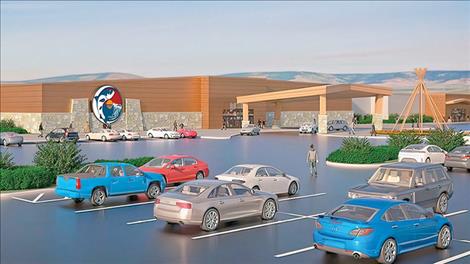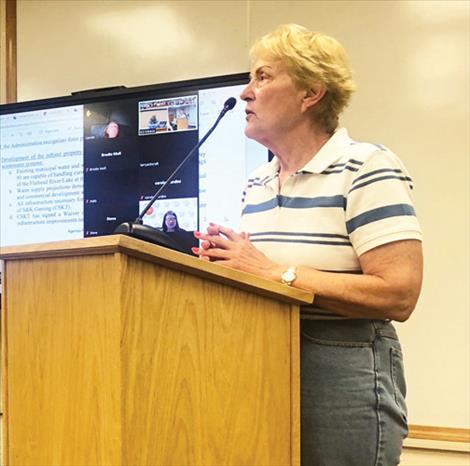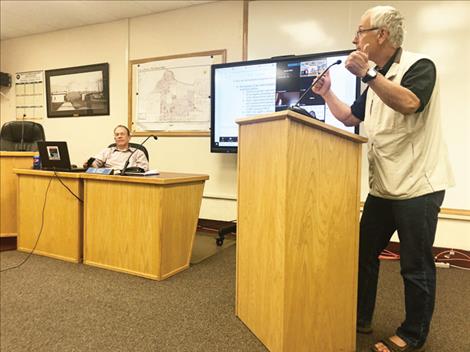Polson City Commission tables casino decision
Hey savvy news reader! Thanks for choosing local.
You are now reading
2 of 3 free articles.
POLSON — The four action items on the Polson City Commission agenda at last week’s meeting – including the proposed annexation of tribal lands for a proposed casino – were all punted down the road, mostly for lack of sufficient information.
The most controversial topic was the proposed annexation of nearly 80 acres of land belonging to the Confederated Salish and Kootenai Tribes, and located west of the Polson bridge. According to a presentation made May 2 to the City Commission, the Tribes are planning to build a 26,100-square-foot casino on the site, with access from Irvine Flats Road. The first phase would include the casino, with future plans calling for a hotel and events center, RV park, residential housing and a commercial area.
If built, the project would shift most gaming operations now housed at KwaTaqNuk Resort to the new facility, which could accommodate up to 350 machines (the resort now has 227). KwaTaqNuk would then revert to its original purpose, serving as a destination resort and restaurant, with a limited number of gaming machines.
At the May meeting, commissioners approved a Resolution of Intent to annex the property, with a public comment period and final vote initially slated for June 6, then rescheduled for last Wednesday, July 7.
During the comment period, the commission received five letters and a petition with 63 signatures from people opposed to the annexation (17 signees were city residents). Comment during the hearing and the subsequent meeting was largely negative as well.
In addition to issues with the potential negative impacts of expanded gaming on the community, people expressed concerns about the casino’s effect on an already congested Highway 93 corridor and on access to services such as fire and ambulance.
City manager Ed Meece, who said city administration favors the annexation, pointed out that, if annexed, the future tribal development would need connections to city water and sewer systems “built at their cost to our specifications,” as opposed to installing a private water/sewer system. Once built, the casino would be treated like any other commercial customer, paying for water and sewer services.
He also told the commission that city and tribal staff are discussing a potential Payment in Lieu of Taxes (PILT) agreement that would help offset the costs of providing city services to the property. The city has other PILT agreements in place with the Tribes, including for KwaTaqNuk Resort, which pays the city $50,000 annually in lieu of taxes, and with the Salish and Kootenai Housing Authority. He also mentioned that the Tribes have waived the right to protest any future Special Improvement District in the area, designed to improve curbs, streets and sidewalks.
Overall, he noted that conversations about the project, which began last fall, have been positive and fruitful, and believes the annexation would help strengthen “the partnership and stakeholder relationship with CSKT.”
He also reminded the commission, and the public, that “despite any of our beliefs or positions with regard to gambling, this is not a moral decision on casinos,” since the Tribes are solely authorized to regulate Class I and Class II gaming on the Flathead Reservation.
“This is a request for annexation,” he added. “It’s not a moral judgement about gambling itself.”
Instead of voting on the annexation, however, commissioner Tony Isbell made a motion to table it, citing his concerns about traffic flow, and whether existing city water and sewer infrastructure could meet the increase in demand. In addition, commissioner Laura Deaver asked to see a copy of the Environmental Impact Study the Tribes prepared for the project, and any preliminary PILT agreements.
Mayor Eric Huffine asked tribal representative Brian Upton whether the casino was apt to be built if the commission opted not to annex the property. “The likelihood is quite strong it would move forward,” Upton said.
Bryon Miller, CEO of S&K Gaming, told the commission that the Tribes have engaged a civil engineer to conduct a traffic study and reach out to the Montana Department of Transportation (MDOT) to discuss concerns about traffic flow.
For those who live on Rocky Point Road, just beyond the proposed casino, the thought of more traffic pulsing on and off Hwy 93 is alarming. Tracy Sharp told the commission that getting on the highway to head into town makes him feel like a frog, “you better make your jump and if you get it wrong it’s going be tragic.”
He urged the commission to meet with MDOT, the Tribes, county and legislators and “bring back answers on how traffic is going to be handled so we don’t have to risk our lives simply going to Super One to get a loaf of bread in the summer.”
Lake County Commissioner Bill Barron, who also lives on Rocky Point Rd., said he goes through the intersection several times a day and often sits at the corner for up to 30 minutes, waiting for a chance to head south. “You cannot state how dangerous that intersection is unless you drive it regularly.”
He advocated a stoplight and perhaps a frontage road but said chances of getting MDOT to make that project a priority are slim. Currently, MDOT’s 10-year plan has no Polson projects listed.
As to fears that the new casino would escalate crime in the area, the former sheriff suggested, “From my perspective we’ve seen the impacts of gambling as far as rising crime – the big impacts to the public are going to be from traffic.”
Linda Reksten, who represents Polson in Montana’s House of Representatives, told the commission that MDOT might be moved with enough pressure from the local legislative delegation, the Tribes, and county and city governments. The state currently has a $1.8 billion budget surplus, she said, adding that MDOT “just received a lot of money from the federal government.”
“I strongly suggest you need to weigh in and not accept a pat answer,” she said, vowing “to do my darndest to get us good things for Polson.”
Prior to voting on the motion to table the annexation, Mayor Huffine said he has mixed feelings about the proposal. “If it’s done right, it definitely can enhance our community,” he said. Among the potential positive impacts he listed were creating jobs and restoring KwaTaqNuk Resort as a more family-oriented destination.
However, due to tribal sovereignty, “right now is the city’s only shot with any leverage,” he said. “All these questions everyone wants answered, this is the only time we can get them answered.”
“I want to table it long enough to have a level of comfort, to know I’m making a decision to enhance my community.”
Five commissioners voted to table the annexation, citing the need for more information on traffic flow, seeing the EIS, and knowing more about the scope of the project, with Carolyn Pardini voting against the motion.
“I’m frustrated with all the tabling,” she said at the end of a meeting in which three other items were tabled. “I think we need to move forward and vote on annexation.”
The commission also tabled two zoning variances. The first was to allow Denny Anderson and Kim Lewis to add to an existing home. But when photos revealed existing rebar and a partial foundation, the commission voted to table the variance until the owners could explain that excavation.
On the second project, a variance was requested to allow street parking for a proposed multi-family dwelling on La Vista Lane. Although the planning team recommended its approval, the project was opposed by members of the La Vista Homeowners Association, who noted that all other residences are single-family dwellings. Concerns were also expressed that on-street parking could impede emergency vehicle access, and that other residences had managed to provide off-street parking.
The commission also considered a recommendation from the Polson Redevelopment Agency to approve a grant application for $20,400 in the Tax Increment Finance District. The funds would be used to help Mark and Dana Johnston make improvements on their house on 2nd St. E., including asbestos removal in the attic, and represent less than 20% of the total project cost of $95,000.
Johnstons began the remodeling project last month, anticipating that the commission would give its approval at its first meeting in June. “We already had the contractors set up and decided we needed to move forward,” explained Johnston.
However, the TIF program stipulates that projects can’t begin until the grant is approved by the city commission. Commissioners voted to table the matter for review by the city attorney, and Meece said it would be back on the agenda for a vote at the next meeting on July 18.


















